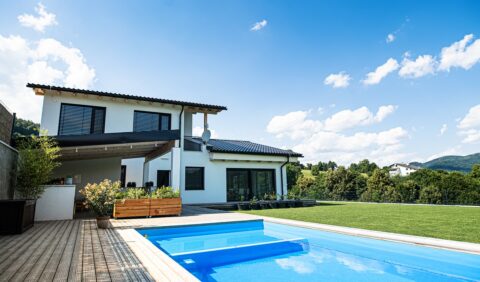Houses with pools have been in higher demand in the past couple of years, perhaps because people are spending more time at home. Owning a pool provides a fun, relaxing way to cool off during hot summer days, as well as a nice gathering place for parties and events. Owning a pool also means that staycations can feel more like vacations, and who doesn’t want that? With this being said, owning a pool comes with its own set of challenges and responsibilities. Before diving in to buying a house with a pool, consider these 6 things before making the investment.
1. Impact on Home Value
Many assume that an inground pool substantially boosts a home’s value in every case. Although inground pools cost $35,000 on average to install, home value does not always increase according to the expected amount. While many houses with pools are selling at a premium, pools can also turn away potential buyers. Location plays a significant role in buyer demand for houses with pools. In colder climates, pools are not as desirable as they are in warmer climates, and this can ultimately factor into home value.
2. The Condition of the Pool
A pool’s condition is not only its surface appearance but its functionality and structure. When examining the condition of a pool, it’s best to be thorough. Sometimes cracks and other deformities are obvious, but structural damage in the foundation of the pool is harder to spot. To get the full picture of the condition of your pool, we recommend you always hire a certified pool inspector during the home inspection timeframe. Knowing exactly what is wrong with a pool before you decide to purchase it will save you money and time down the road.
3. Safety Features
There are certain federal, state, and local regulations that pools must comply with for the safety of everyone enjoying the pool. Before purchasing a home with a pool, hire a certified pool inspector to ensure that your pool is up to code. Pool inspectors also look for structural damage, electrical equipment functionality, and other areas of concern that pertain to the overall safety and functioning of your pool.
As a tip, many home inspection services also offer pool inspections, so it is likely that you can utilize the same service to inspect the home and the pool before you purchase the house.
Fences, alarms, and pool covers are some additional safety features that can be installed to ensure that your pool is a safe area for your kids and family.
4. Service and Maintenance
Although it’s not as relaxing as swimming in the crystal-clear water, pool maintenance is necessary for enjoying the pool, increasing the pool’s longevity, and reducing the amount of expensive repairs. Basic maintenance includes consistent cleaning, balancing chemicals to ensure proper pH and alkalinity of the water, replacing filters, vacuuming, and more. Certain maintenance tasks are seasonal; others will have to be done across seasons to ensure that the pool will be ready for enjoyment in the summer.
For this reason, pool maintenance can feel more like a part-time job than a passion project, especially if you’re unsure about what exactly must be done. If it’s within your budget, you might want to consider leaving the maintenance to a pool service team.
5. Insurance and Utilities
In addition to maintenance costs, pools will also increase insurance and utility bills. Liability coverage will cost more due to the higher risk of injury involved with pools. Pool additions, such as diving boards, could also raise the insurance premium.
A heated or lighted pool will use more electrical energy. HomeAdvisor reports that operating a pool pump can cost up to $300 a year in electricity. Filling a pool will increase water bills as well.
6. Pool Equipment
Pool equipment like chemicals, vacuums, skimmers, and other maintenance supplies are an investment and will also need their own storage area to keep them dry. Make sure that you consider the cost of all of these items before making your final decision.
Ultimately, the value of owning a pool largely depends on whether or not you want one in the first place. Knowing the exact condition of the pool, the costs of upkeep, and the energy involved will help you in your decision to purchase a house with a pool.

 Facebook
Facebook
 X
X
 Pinterest
Pinterest
 Copy Link
Copy Link





